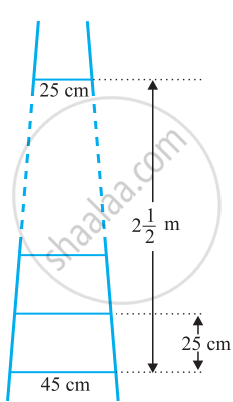Advertisements
Advertisements
प्रश्न
If the first term of an A.P. is p, second term is q and last term is r, then show that sum of all terms is `(q + r - 2p) xx ((p + r))/(2(q - p))`.
उत्तर
Given: First term (t1) = a = p, Second term (t2) = q, tn = r
Common difference (d) = t2 – t1 = q – p
According to the question,
tn = a + (n – 1) × d
r = p + (n – 1) × (q – p)
(r – p) = (n – 1) × (q – p)
n – 1 = `(r - p)/(q - p)`
n = `(r - p)/(q - p) + 1`
n = `(r - p + q - p)/(q - p)`
n = `(r + q - 2p)/(q - p)`
We know
Sn = `n/2[2a + (n - 1)d]`
= `(r + q - 2p)/(2(q - p)) [2p + ((r + q - 2p)/(q - p) - 1) (q - p)]`
= `(r + q - 2p)/(2(q - p)) [2p + ((r + q - 2p - (q - p))/(q - p)) (q - p)]`
= `(r + q - 2p)/(2(q - p)) [((r + q - 2p - q + p)/(q - p)) (q - p)]`
= `(r + q - 2p)/(2(q - p))[2p + ((r - p)/(q - p)) (q - p)]`
= `(r + q - 2p)/(2(q - p))[2p + r - p]`
= `(r + q - 2p)/(2(q - p))[r + p]`
Sn = `(q + r - 2p) xx ((p + r))/(2(q - p))`
Hence proved.
APPEARS IN
संबंधित प्रश्न
The sum of the first p, q, r terms of an A.P. are a, b, c respectively. Show that `\frac { a }{ p } (q – r) + \frac { b }{ q } (r – p) + \frac { c }{ r } (p – q) = 0`
In an AP, given a = 2, d = 8, and Sn = 90, find n and an.
Show that a1, a2,..., an... form an AP where an is defined as below:
an = 9 − 5n
Also, find the sum of the first 15 terms.
A ladder has rungs 25 cm apart. (See figure). The rungs decrease uniformly in length from 45 cm at the bottom to 25 cm at the top. If the top and bottom rungs are 2 `1/2` m apart, what is the length of the wood required for the rungs?
[Hint: number of rungs = `250/25+ 1`]

Find the sum of the following arithmetic progressions: 50, 46, 42, ... to 10 terms
Find the sum of first 22 terms of an A.P. in which d = 22 and a = 149.
Find the 8th term from the end of the AP 7, 10, 13, ……, 184.
How many two-digit number are divisible by 6?
Find the sum of all multiples of 9 lying between 300 and 700.
Find the sum of the first 15 terms of each of the following sequences having nth term as xn = 6 − n .
If the sum of a certain number of terms starting from first term of an A.P. is 25, 22, 19, ..., is 116. Find the last term.
The sum of first 9 terms of an A.P. is 162. The ratio of its 6th term to its 13th term is 1 : 2. Find the first and 15th term of the A.P.
If Sn denotes the sum of the first n terms of an A.P., prove that S30 = 3(S20 − S10)
Let the four terms of the AP be a − 3d, a − d, a + d and a + 3d. find A.P.
Q.4
Q.11
How many terms of the A.P. 27, 24, 21, …, should be taken so that their sum is zero?
Find the sum of numbers between 1 to 140, divisible by 4
The sum of 40 terms of the A.P. 7 + 10 + 13 + 16 + .......... is ______.
